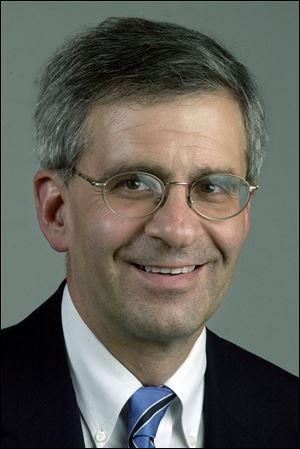
COMMENTARY
Hillary Clinton has a clear — yet perilous — presidential course
8/29/2014
Shribman
The National Football League preseason is about over. The 2016 presidential preseason still has a few months left — for every candidate but Hillary Clinton.
For Mrs. Clinton, familiar to Americans as first lady, senator from New York and secretary of State, there is no preseason. She’s been at the center of American attention for almost a quarter-century.
No other American woman in our history has been so prominent for so long, with the possible exception of Eleanor Roosevelt. Franklin D. Roosevelt’s wife was in the public eye for 29 years, but held no elected office.
Mrs. Clinton’s national profile has become more vivid since she stood beside Bill Clinton 23 years ago this fall as he announced his candidacy for the White House. Every statement she utters makes news. She doesn’t get to try out her lines in private the way her putative rivals do.
It’s a great advantage — and a great disadvantage.
The advantage is that she is by far the front-runner for the 2016 Democratic presidential nomination. She has a position more commanding than any other nonincumbent candidate at least since Walter F. Mondale in 1984, and perhaps since Adlai Stevenson in 1956. She will have money at hand, and attention wherever she goes.
For the next several months, her very presence — as a candidate if she becomes one, as a professed noncandidate until she withdraws — keeps others from the race. And it keeps dollars from potential rivals.
The disadvantage is that when she says she and her husband were broke when they left the White House, or when she appears to seek distance from President Obama and then appears to try to close the gap, she does so in the full glare of the public spotlight.
All that helps explain a curious wrinkle in public-opinion polling that is evident in the latest survey from the well-regarded Marist College Institute for Public Opinion.
That survey shows Mrs. Clinton in two unremarkable positions: supported ardently by Democrats, opposed virulently by Republicans. In other years, important political figures have had performances that did not merit the adverbs (ardently, virulently) and thus have had cross-party appeal.
But there is less of anything that appears across party lines today, so maybe the importance of that is smaller than it might otherwise appear.
The Marist survey shows Mrs. Clinton defeating former Gov. Jeb Bush of Florida by 7 percentage points, Gov. Chris Christie of New Jersey by 6 points, and Sen. Rand Paul of Kentucky by 4 points. These are relatively small margins, especially this early in the political cycle.
But that is not what should be worrisome to Mrs. Clinton’s strategists.
This is: Her support among independent voters — who count in some primary states and who are potentially decisive in general elections — declined against each of those potential rivals. That margin has declined by 10 points against Mr. Bush and 9 against Mr. Paul.
“She’s upped her visibility with her book tour and some of her misstatements, and that has shaken loose a few independents,” explains Lee Miringoff, who directs the Marist poll. “For a while, the idea of her as a presidential candidate was abstract. Now people are getting a taste for what a second Hillary candidacy might be like.”
Her first campaign in 2008 — a pioneering effort by a female candidate — was upended by the kind of inflexibility that did not allow for the entrant of another pioneer, the first mainstream black candidate. Nor did it allow for the importance of caucus states, which Mr. Obama focused on and captured while Mrs. Clinton’s forces fought with each other and concentrated on primary states. Mrs. Clinton’s 2008 campaign is regarded as an astonishing series of missed opportunities and squandered potential.
Mrs. Clinton can take some comfort from the notion that as the lone contender in the Democratic presidential race, all of her moves, especially missteps, prompt an outsized reaction. Now, the campaign is akin to walking on heels across concrete in an empty room. Once other candidates are in the race — and some surely will join — that room will have some carpeting and it will no longer be empty.
Even so, the perils of tripping are greater for her than for any other candidate. That’s the price of being on top.
David Shribman is executive editor of the Pittsburgh Post-Gazette.